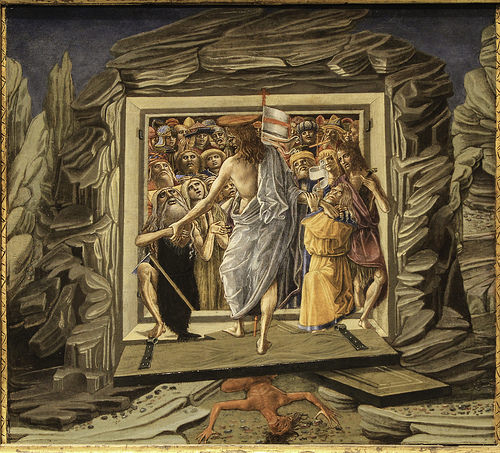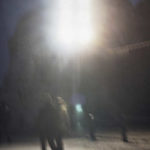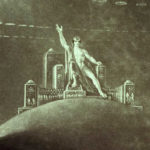We run our website the way we wished the whole internet worked: we provide high quality original content with no ads. We are funded solely by your direct support. Please consider supporting this project.

What Happened on the Cross?
Since the time of Anselm (11th century), and especially since the Reformation in the 16th century, the tendency of the Western church has been to focus almost all of its attention on the anthropological dimension of the atonement, usually to the neglect of the cosmic dimension that is central to the NT. In the standard Protestant view, the chief thing God was accomplishing when he had Jesus die on the cross was satisfying his perfect justice and thereby atoning for our sins. The work of the cross is centered on us.
While I do not minimize this aspect of Christ’s work, I cannot agree that the primary significance of the cross is found here. From the perspective of the NT, the anthropological significance of Christ’s death and resurrection is rooted in something more fundamental and broad that God was aiming at: to defeat once and for all his cosmic archenemy, Satan, along with the other evil powers under his dominion, and thereby to establish Christ as the legitimate ruler of the cosmos, and human beings as his legitimate viceroys upon the earth.
Whereas since Anselm the dominant way of thinking about the atonement focused on what it accomplished for humanity (reconciliation to God), and thus viewed what it accomplished against Satan and evil powers as a byproduct, the view that I espouse is that the NT construes the relation between these two aspects of the cross in the converse order. Christ’s achievement on the cross is first and foremost a cosmic event—it defeats Satan.
Thus as Scripture portrays the matter, the foundational reason Christ appeared was “to destroy the works of the devil” (1 Jn 3:8), to disarm “the rulers and authorities” (Col 2:15), and to “destroy the one who has the power of death, that is, the devil” (Heb 2:14). The consequence of this victory is that he is seated on his rightful throne, the whole cosmos is liberated from a tyrannical and destructive ruler, humanity is delivered “from the power of darkness and transferred … into the kingdom of his beloved Son (Col 1:13), and all who accept it are thereby reinstated to the original position and responsibility of stewards of the creation that God had always intended for us.
While Christ’s substitutionary death for sinful humans is central for understanding what Christ did for us, therefore, this dimension of Christ’s work is possible only because of the broader cosmic victory Christ won on the cross.
Through the death and resurrection of Jesus Christ, God stripped Satan and all levels of demons of all their power (Col 2:15). Therefore Christ now reigns in the power of God far above all such demonic powers. Expressing the tension of the “already/not yet” that characterizes the entire NT, Paul can say that “all things” are already “under his feet,” (Eph 1:21-22) though the actual manifestation of this truth is yet in the future. But the central point remains: the work of the cross was about dethroning a cruel, illegitimate ruler and reinstating a loving, legitimate one: Jesus Christ. When Jesus Christ is reinstated, all who are aligned with his rule, all who are “in Christ,” all who are his “bride” and part of his “body,” are reinstated to their appropriate position of authority as well. In a word, we are saved because he is victorious.
—Adapted from God at War, pages 240-246
Image by Lawrence OP via Flickr
Category: Q&A
Tags: Already Not Yet, Atonement, God, God at War, Jesus, Satan
Topics: Atonement and The Cross, Spiritual Warfare, Cosmic Conflict
Related Reading

The Holy Alternative
God is holy because he’s utterly “other” and distinct from anything in the created world. Certain objects are called holy because they’re set apart from common objects, having been consecrated to God for a special purpose. And God’s people are called to be holy by virtue of the radically different kind of life we live.…

Did Jesus Say That God Causes Blindness?
As he went along, he saw a man blind from birth. His disciples asked him, “Rabbi, who sinned, this man or his parents, that he was born blind?” “Neither this man nor his parents sinned,” said Jesus, “but this happened so that the works of God might be displayed in him (Jn 9:1-3, NIV) Commentators typically appeal to this passage…

Making Resolutions? Consider This!
So, this is the time of year when we all look back at the year that is passing and look ahead to the new year in front of us. If you’re considering a New Year’s resolution, we wanted to make a tiny suggestion for your consideration. Greg has been fleshing out the ReKnew Manifesto in his…

Guest Post: Culture War Neighbors by Bonnie Kristian
Matteo Parrini via Compfight The first time I was aware of meeting a gay person, I was 18. I took a summer job waiting tables, and it turned out two of my coworkers were attracted to people of the same sex. One, a waiter in his 40s, fit every stereotype on Will and Grace. The…

Why Believe that There Is a God?
“Why should we believe in God in the first place?” This was a question that Greg’s father asked of Greg. While there are many ways to respond, Greg’s offered what is called “the anthropological argument.” Here is an excerpt from Letters from a Skeptic. _____________________ My basic line of reasoning is this: We human beings…

Podcast: Did Hell Exist Before Satan Fell?
Children ask the cutest questions. Greg considers the origins of hell and other burning questions. http://traffic.libsyn.com/askgregboyd/Episode_0460.mp3
